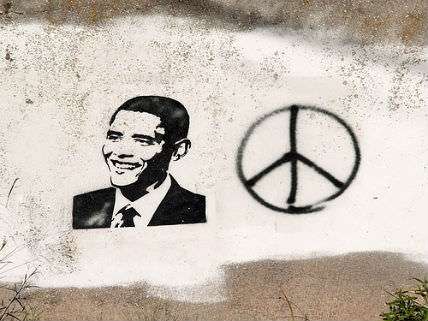Obama Administration Refuses Opportunity to Repudiate Japanese Internment Ruling
Korematsu v. United States, the 1944 ruling where the Supreme Court upheld President Franklin Roosevelt's wartime internment of Japanese-Americans, is a notorious and shameful piece of work. Yet it still remains a valid decision, having never been overruled by a later Court.
But let's say a new case appeared on the horizon today presenting the chance to formally repudiate Korematsu. Would the Obama administration join in the effort to wipe the ugly precedent off the books? Surprisingly, the answer turns out to be "no."

Among the petitions currently seeking review by the Supreme Court is one from a case known as Hedges v. Obama. At issue is whether a group of antiwar journalists and writers, including author Chris Hedges and MIT professor Noam Chomsky, have standing to challenge a section of the National Defense Authorization Act for Fiscal Year 2012 authorizing the president to "detain" any person "who was a part of or substantially supported al-Qaeda, the Taliban, or associated forces that are engaged in hostilities against the United States or its coalition partners." The U.S. Court of Appeals for the 2nd Circuit ruled against those plaintiffs on standing grounds last summer, prompting the December petition to the high court.
In addition to raising questions about President Barack Obama's power to indefinitely detain terrorism suspects, Hedges also raises the question of Korematsu's continuing validity. That latter point was driven home to the Obama administration on January 13, 2014, when Solicitor General Donald Verrilli received a letter from three prominent civil rights lawyers urging him to use Hedges as a welcome opportunity for the federal government to repudiate Korematsu once and for all. Here's a portion of that letter sent to Verrilli:
A request by your Office that the Court formally overrule the internment decisions would fulfill the duty of absolute candor that was sadly lacking in the government's briefs and arguments in 1943 and 1944. Should you decide not to make such a request, however, we urge that your Office make clear in its response to the Hedges petition that the government does not consider the internment decisions as valid precedent for governmental or military detention of individuals or groups without due process of law, and as not among any "authorities" to which Sec. 1021(e) [of the National Defense Authorization Act for Fiscal Year 2012] refers.
Last week the Obama administration finally submitted its response to the Hedges petition. And as Lyle Denniston reports at SCOTUSblog, the letter quoted above failed to do the trick: Korematsu went entirely unmentioned in the government's brief. "The Obama administration, urging the Supreme Court to turn aside a new challenge to presidential power to detain individuals suspected of terrorism links," Denniston observes, "chose not to support a years-long campaign to get the Court to repudiate one of its most heavily criticized opinions from the World War II era."
The administration's refusal to act is baffling. Korematsu is enveloped in a bipartisan chorus of disapproval. Legal experts from across the ideological spectrum agree it was a terrible ruling. So the White House would seem to risk little and gain much by taking a strong legal stand against such an easy target. Hopefully a future administration will take a different view of the matter when the next opportunity arises.
Related: Reason TV reports on "Hawaii's Forgotten Internment Camps."

Show Comments (18)